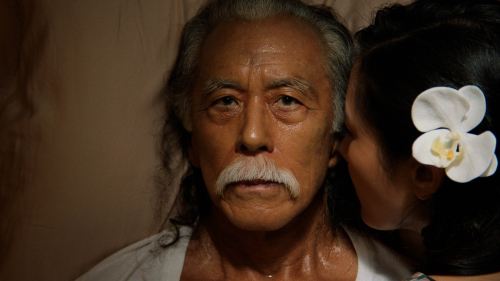
Eunsoo Cho/Sundance Institute
MOVIE REVIEW
I Was a Simple Man (2021)
Writer-director Christopher Makoto Yogi’s “I Was a Simple Man” is not exactly a work of startling originality. The way it mythicizes Oahu, Hawaii, as a place unspoiled by time and modernity is not unlike Apichatpong Weerasethakul’s depiction of Thailand in “Uncle Boonmee Who Can Recall His Past Lives.” The two films share earthy scenery, clairvoyant characters and superstitious rituals, but “I Was a Simple Man” elides that lost-in-translation pastiche symptomatic of Mr. Weerasethakul’s neo-Orientalism.
Widower Masao (Steve Iwamoto) is utterly alone as he gradually deteriorates and succumbs to terminal illness. His three adult children aren’t much help: Henry on the “mainland” is only heard in phone conversations and never seen; Kati (Chanel Akiko Hirai) has her hands full with a large family of her own; and Mark (Nelson Lee) can’t take care of even himself due to developmental issues and/or extrasensory abilities. As Masao reckons with his past as an irresponsible absentee dad, an apparition of his wife, Grace (Constance Wu, redeeming herself within the A.A.P.I. community in a thankless role after the “Fresh Off the Boat” Twitter fiasco) appears as he further revisits his life’s regrets.
The natural milieu of Oahu establishes the contemplative mood, but what sets the film apart is its depiction of disability, as Masao’s life progresses inward while the rest of the world moves along without him. When debilitating illness confines him to bed, memories literally become present. It’s an idea explored rarely, if at all, since 2007’s “The Diving Bell and the Butterfly.”
“I Was a Simple Man” proves genuinely moving despite – or perhaps because – it doesn’t sugarcoat its protagonist’s fuck-ups. Even if those can be excused by personal tragedies, they still deeply scar his loved ones for life. Masao does not ultimately get absolution, but he will learn to live with himself – past and present – in peace in the most literal sense.
Comments